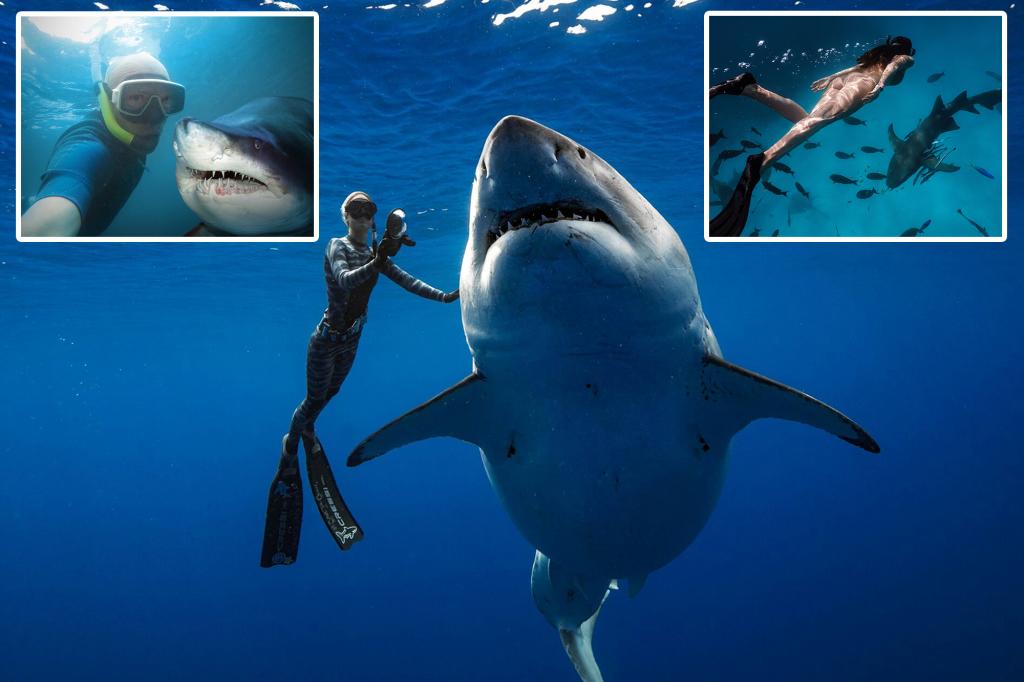Jaws and effect.
Just when you thought it was safe to Go-Pro back in the water: French scientists have attributed the spike in shark attacks to selfie-taking influencers encouraging tourists to pet the toothy predators, per a “Jaws”-dropping study in the journal Frontiers in Conservation.
Contrary to sharks’ portrayal as mindless killing machines in movies, researchers argued that many of the so-called attacks were defensive responses to being poked and prodded by online clout-seekers.
“I don’t encourage, as many influencers do on social networks, [people] to cling to a shark’s dorsal fin or stroke it, under the pretext of proving that they are harmless,” lead researcher Professor Eric Clua of PSL University in Paris, France, told the Times of London.
He was citing the growing genre of videos in which content creators film themselves swimming with and even poking the toothsome sea beasts. In one popular Instagram clip, wildlife photographer Taylor Cunningham is pictured touching the nose of a tiger shark off of Hawaii. “The sharks here feel like family,” the self-proclaimed “crazy shark lady” gushed in the caption.
Coincidentally, the study comes just two months after a Canadian tourist lost both her hands after getting bitten by a 6-foot shark that she was trying to take a photo with in Turks and Caicos. Earlier this month, Barak Tzach, 40, a father of four who was killed while trying to film sharks in the water off Hadera, Israel. Although it’s unclear in either case if the victims touched or fed the predators.
To examine the cause of recent shark attacks, Professor Clua and his team examined records of encounters off the coast of French Polynesia between 2009 and 2023.
They found that of the 74 bites recorded during this period, most of which were from smaller and medium-sized sharks, around 5% were likely to have been the result of sharks acting out in defense.
He noted that these defensive bites came without warning and involved several bites, which generally only resulted in superficial wounds.
A subsequent analysis of the Shark Attack Files — a global database with records dating back to the 1800s — revealed more than 300 incidents that were also defensive in nature.
Clua says part of the problem is that fin-fluencers interact with strange sharks — especially smaller ones — in a manner that they wouldn’t with an unfamiliar dog.
“People know the difference between a [Yorkshire terrier] and a pit bull, whereas they don’t know the difference between a blacktip reef shark and a bull shark, which are their marine equivalents,” he said. “There’s an incredibly negative perception bias towards sharks … they are responsible for fewer than ten human deaths a year worldwide, whereas dogs are responsible for more than 10,000 deaths and are perceived positively by the public.”
Coincidentally, a 2020 study found that more people die taking selfies than are killed by sharks (read into that how you will).
Along with various influencers, many celebrities have been filmed swimming with the sharks, including the singer Ciara, and movie stars such as Bella Thorne and the actors Zac Efron and Will Smith.
Unfortunately, it’s not just laypeople who are to blame for poking the bear, er, shark.
In 2019, Oahu-based marine biologist Ocean Ramsey made waves after she was filmed swimming alongside and touching a great white shark believed to be Deep Blue — which, at 20 feet long, is allegedly the largest in the world.
Her aquatic King Kong saga was subsequently criticized by shark researcher David Shiffman. “I can’t believe that ‘please don’t grab the 18-foot-long wild predator’ is something that needs to be explicitly said out loud, but here we are,” he told the Washington Post at the time.
Professor Clua said that ultimately, he hopes his research will both reduce the number of bites in the field and persuade journalists to take a closer look at the circumstances under which attacks occur, so they’ll blame the human rather than the animal.
When it comes to interacting with sharks, scientists urge people to look, but not touch them.
“Enjoy its beauty, but remember they are wild animals, predators that can act as predators,” he warned. “It is not only a matter of safety but also of respect.”
Read the full article here







